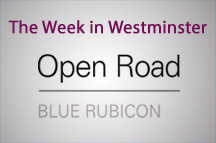 When plans to cut tax credits were announced in July, it was one of the more controversial measures announced from what was otherwise another politically astute Budget from George Osborne. Over the party conference season and since the return of Parliament from conference recess, there has been a growing chorus of protest, both within and without Parliament and not always from the expected sources.
When plans to cut tax credits were announced in July, it was one of the more controversial measures announced from what was otherwise another politically astute Budget from George Osborne. Over the party conference season and since the return of Parliament from conference recess, there has been a growing chorus of protest, both within and without Parliament and not always from the expected sources.
We could have expected Labour to focus its attack on tax credits, as its backbenchers did relentlessly in this week's PMQs. But it will be the noises from his own party that will begin to rile the Prime Minister. Heidi Allen, newly elected Conservative MP for South Cambridgeshire (the now Lord Andrew Lansley’s old patch), has quickly made a name for herself by delivering an impassioned maiden speech in which she accused the Chancellor of “betraying Conservative values”, and that the party was out of touch by cutting tax credits too hard and too fast. Several Tory MPs have lent weight to her views by backing a cross party call to soften the impact of the cuts on those it will hit hardest.
Despite all this, the Bill did pass the Commons, but by a very narrow margin. With recent research suggesting that 71 Conservative MPs are potentially at electoral risk from the policy, that is perhaps not surprising. The realities of governing with such a small majority, should Cameron have needed reminding, are now all too clear.
 Certain peers have already indicated that they intend to block the Bill, and without a majority in the House of Lords they may well be able to do so. In response, the Prime Minister has warned that he's prepared to do what it takes to ensure the Bill's safe passage, including packing the House of Lords with Conservative peers. The PM warned peers to “think carefully” about their constitutional position, as peers mull which of the various parliamentary mechanisms could best achieve their aims. Former Chancellor Ken Clarke's robust speech in defence of the measures earlier this week in which he urged Osborne to 'get his tin hat on' must have been some comfort to the Government in an otherwise bruising week.
Certain peers have already indicated that they intend to block the Bill, and without a majority in the House of Lords they may well be able to do so. In response, the Prime Minister has warned that he's prepared to do what it takes to ensure the Bill's safe passage, including packing the House of Lords with Conservative peers. The PM warned peers to “think carefully” about their constitutional position, as peers mull which of the various parliamentary mechanisms could best achieve their aims. Former Chancellor Ken Clarke's robust speech in defence of the measures earlier this week in which he urged Osborne to 'get his tin hat on' must have been some comfort to the Government in an otherwise bruising week.
Meanwhile, there have been a lot of parallels drawn between this crisis and the poll tax crisis in 1989. Whether it will get that far is unclear, but it has certainly has the potential to dent the Chancellor’s image, and in turn any plans he might have to succeed Cameron. One thing worth noting about the poll tax riots; while they did bring down an administration (Thatcher’s), the Conservatives held on and won the following election. There are very short memories in politics.
Aside from tax credits, the Government is facing significant pressure on the fate of the UK’s steel industry with thousands of job losses reported, and more feared to come. It didn’t help that they were announced on the first day of the Chinese premier’s state visit, bringing pressure on the PM to directly raise the concerns of the UK steel industry that China has been contributing to the crisis by dumping cheap steel on the UK and Europe.
 Elsewhere, there was the sad news that Labour MP and former minister, Michael Meacher, has died. The by-election for his seat will be the first electoral challenge for all of the parties, including Labour. Assumedly safe with a majority of over 14,000 in May, UKIP will be looking to capitalise on its previous second place, and hoping to prove that it poses an even greater threat to Labour under Corbyn.
Elsewhere, there was the sad news that Labour MP and former minister, Michael Meacher, has died. The by-election for his seat will be the first electoral challenge for all of the parties, including Labour. Assumedly safe with a majority of over 14,000 in May, UKIP will be looking to capitalise on its previous second place, and hoping to prove that it poses an even greater threat to Labour under Corbyn.














